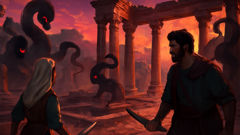Introduction
Beneath the boundless blue of an ancient Persian sky, where sun-drenched mountains cradle emerald valleys and the air carries whispers of a thousand forgotten tales, the legend of the Pari takes flight. For generations, the people of Iran have spoken of these ethereal beings—delicate as silk and radiant as the dawn—whose gossamer wings shimmer with all the colors of the desert sunrise. The Pari, neither wholly angelic nor fully free of shadow, are as intricate and mysterious as the land they watch over. Some call them guardians, others say they are exiles, forever caught between the realms of light and darkness. Stories paint them as both the harbingers of fortune and as keepers of secrets, dwelling in the hidden places where humans rarely tread: atop snow-capped peaks, within lush orchards blooming under the moon, or deep in the ruins of ancient palaces. In every Persian village, children gather by lamplight to hear their elders recount encounters with the Pari—stories of breathtaking beauty, sorrowful longing, and quiet acts of kindness that change the fate of mortals. Yet, the full story of the Pari is a tapestry woven with threads of hope and despair, their destiny forever shaped by the eternal struggle between good and evil. Their legend is a reflection of Persia itself: dazzling, complex, and timeless, where the boundaries between the mundane and the miraculous are as thin as a veil. So it is that in the shadow of the Zagros Mountains, in an era when kings reigned from the golden halls of Persepolis and the world was still alive with magic, a single act of courage and compassion would bind the fate of a humble healer and a Pari, and through them, the destiny of an entire people.
Whispers in the Valley: A Mortal's Encounter
Arash was a young healer in the village of Cheshmeh Sefid, nestled at the foot of the Zagros Mountains. His hands were gentle, his heart was generous, and his mind was restless with questions no elder could answer. Every morning before dawn, he would wander through the dew-soaked fields, collecting herbs beneath the watchful gaze of Mount Dena. The villagers often found comfort in his presence, believing Arash’s remedies to be blessed by something beyond mortal understanding.

On a morning thick with the scent of hyacinth and rosewater, Arash strayed farther than usual. He crossed the clear waters of a hidden spring and entered an ancient grove where light danced through the branches in flickering patterns. It was there, in the hush between birdsong and breeze, that he saw her: a figure luminous as starlight, poised atop a mossy stone. Her hair shimmered like river-silk and her wings, translucent and vast, fluttered with iridescent color. For a heartbeat, Arash forgot to breathe. The Pari—real, alive, and impossibly beautiful—regarded him with eyes that held both kindness and sadness.
The Pari spoke in a voice like distant wind-chimes. "Why do you come so far from home, healer?"
Arash bowed his head, trembling. "I seek cures for my people. The children grow sick, and no herb or prayer has eased their fever. I hoped to find wisdom among the ancients."
She smiled, but sorrow lingered at the edges. "You seek hope in a world where hope is rare. My name is Shabnam. I am one of the Pari, but I am not free to offer miracles as I once did. There is a shadow upon the land—a darkness growing in the east, twisting the hearts of men and spirits alike."
As the sun climbed higher, the grove grew warmer. Shabnam revealed that once, long ago, the Pari had moved freely among mortals, bringing rain to parched fields and guiding travelers lost in the desert night. But now, with the rise of an ancient evil—the Divs—many Pari had retreated to hidden places, bound by oaths and fear. The Divs, sinister spirits of chaos and malice, sought to corrupt all that was pure in Persia, turning the Pari’s gifts into curses. Only those with untainted hearts could see or help the Pari.
Arash’s compassion stirred something within Shabnam. She offered him a single feather, luminous and light as breath. “This will reveal what is hidden and protect you from the Divs’ poison. But use it wisely—its power is bound to your intent.”
As he returned to his village, Arash found himself changed. The feather glowed faintly in his hand, and when he pressed it to a sick child’s brow, the fever broke as if washed away by spring rain. Yet, he felt a shadow lurking at the edges of his mind: the knowledge that true healing would demand more than mere magic. It would require courage, sacrifice, and a trust in powers both seen and unseen.
As dusk fell over Cheshmeh Sefid, Arash gazed at the mountains and wondered what price must be paid to bring light where darkness threatened to devour all.
The Shadow of the Divs: A Land in Peril
The days that followed brought unease to Cheshmeh Sefid. Children who had once laughed in the river meadows now stayed indoors, frightened by nightmares. Crops withered under strange mists, and livestock were found wandering with glassy eyes, as if entranced by an unseen force. The village elders whispered that the Divs had awoken—drawn by the hope sparked by the Pari’s feather.

Arash turned to Shabnam for counsel, venturing nightly into the secret grove. Each time, he saw her more clearly; her wings, though still breathtaking, seemed weighed down by invisible burdens. She revealed that the Divs had grown stronger as belief in old wonders faded. These spirits fed on despair and doubt, and with every lost faith, their reach extended further into the world of men.
One evening, as a crimson dusk bled over the mountains, Shabnam led Arash to the ruined temple of Anahita, goddess of water and wisdom. Once a place of joyful offerings and holy springs, the temple now stood in ruin—its mosaics cracked, its pools dry. Here, Shabnam explained, the veil between mortal and spirit realms grew thin. "The Divs fear this place," she murmured. "But their leader, Azarkan, seeks to shatter the last boundary. If he succeeds, darkness will spread beyond these valleys—over all Persia."
Arash knelt by the dry pool and listened as Shabnam told him the story of her exile. Long ago, she had defied the Pari elders by helping mortals in secret, earning the wrath of those who feared upsetting the cosmic balance. Now, she was forbidden to return to her kin unless she proved that hope could still thrive among humans. Arash’s kindness had rekindled that hope, but the Divs hunted her relentlessly, seeking to extinguish her light forever.
Determined to aid her, Arash devised a plan. By restoring the temple’s sacred spring, he believed they could create a sanctuary strong enough to repel the Divs. But the path would be fraught with peril: Azarkan’s minions already prowled the forests, and every night brought new omens—shadowy figures in the fields, sudden storms, and whispers that seemed to chill the very air.
Together, Arash and Shabnam worked in secret. By moonlight, he gathered stones and herbs; by dawn, she sang ancient songs that coaxed dew from the barren earth. Villagers noticed subtle changes: a sweet fragrance on the wind, a sense of calm near the old temple. But Azarkan was not idle. He appeared to Arash in dreams, promising power and riches in exchange for betraying Shabnam. With every refusal, Arash felt his spirit grow heavier, his resolve tested by fear and doubt.
In the heart of a storm-tossed night, Azarkan unleashed his fury. The village was plunged into chaos as mists thick as midnight snaked through the streets, twisting shadows into monstrous forms. Arash raced to the temple, clutching the Pari’s feather, as Shabnam stood beneath the shattered archway—her wings spread wide, defiant against the darkness. It was then that hope flickered brightest, for in the face of overwhelming fear, mortals and Pari stood together, determined to reclaim their world from the clutches of evil.
A Feather’s Light: The Battle for Dawn
The night of the battle arrived with an unnatural chill. The villagers huddled in silence as the wind carried whispers of despair. Only Arash, guided by the radiant feather and Shabnam’s unwavering faith, dared approach the temple. He found Shabnam kneeling by the dried spring, her hands cupping a faint orb of light. Her song was soft but unbroken, each note weaving a delicate web of protection around the sacred ground.

Suddenly, the Divs descended. Wraith-like and many-eyed, they slithered through shadows, led by Azarkan—a towering figure whose presence seemed to swallow all warmth. His voice echoed off broken stones: “Surrender, Pari. The age of wonder is dead. Let despair reign.”
But Shabnam’s song only grew stronger. Arash pressed the feather to his heart, feeling its warmth pulse through his veins. As Azarkan lunged, a blinding glow erupted from the feather, forcing the Divs back. Arash spoke aloud the ancient words Shabnam had taught him, words few mortals remembered: "Let water flow, let hope return." He struck the earth with his staff, and from the parched ground burst a spring so pure that it shimmered with every color of dawn.
The Divs howled in agony as water flooded the temple’s ruins. The spring’s light grew brighter, forcing them to retreat. Azarkan lingered, his form flickering between shadow and substance. “You cannot banish us forever,” he hissed. But Shabnam stood tall beside Arash, her wings now brilliant and unburdened. “So long as hope lives in mortal hearts, you shall never triumph.”
The villagers, drawn by the commotion, gathered at the temple’s edge. Seeing Arash and Shabnam standing amid the restored spring, they fell to their knees in awe. For the first time in generations, they believed—not just in magic, but in their own power to choose light over darkness.
The spring washed over Cheshmeh Sefid, breaking every curse Azarkan had cast. Children woke from nightmares laughing, fields blossomed with wildflowers, and the air grew sweet with new life. Shabnam’s exile was lifted; she could return to her kin, but she chose to linger a little longer, watching over the village that had restored her faith.
Arash became more than a healer—he was remembered as a bridge between worlds, a reminder that compassion can heal even wounds that run deeper than time. And in every hidden glen and secret garden of Persia, people began to tell new tales: of Pari who walked unseen among mortals, of springs that never ran dry, and of a land where hope could not be conquered by darkness.
Conclusion
Long after the battle faded into memory, the legend of the Pari endured in every whispering grove and bustling bazaar of Persia. The villagers of Cheshmeh Sefid never forgot the sight of Arash and Shabnam standing side by side—mortal and spirit united by courage and hope. Each spring, on the anniversary of the miracle, children wove garlands of wildflowers to float upon the sacred pool, believing that Shabnam still watched over them from unseen heights. The Pari themselves remained elusive, glimpsed only in moments of deepest need: a fleeting shimmer in moonlit orchards, a soft touch in the cool mountain air. But their story lived on as a beacon against despair, proof that goodness thrives when nurtured by faith and kindness. The world changed, empires rose and fell, but in every telling of the legend, one truth remained: that between angels and evil spirits, there will always be those who choose to bring light. And so the Pari danced on—guardians not only of ancient Persia, but of every heart that refuses to surrender to darkness.













